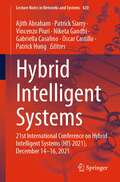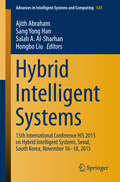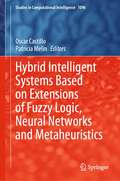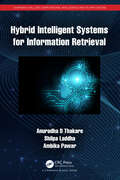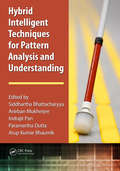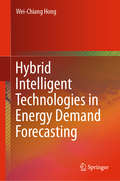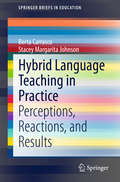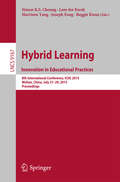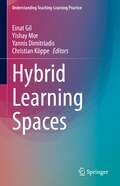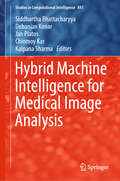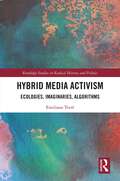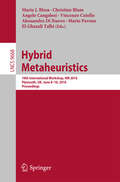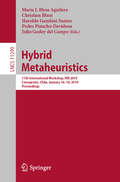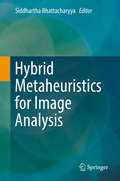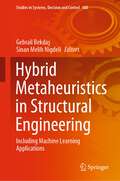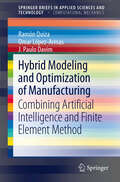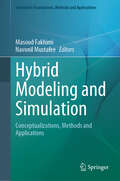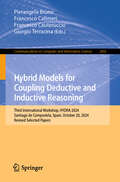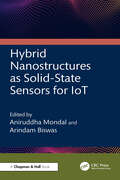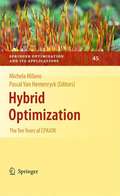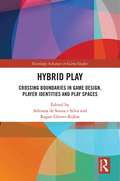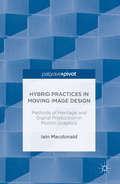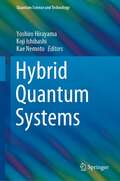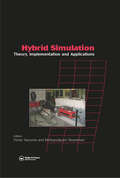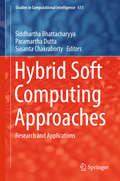- Table View
- List View
Hybrid Intelligent Systems: 21st International Conference on Hybrid Intelligent Systems (HIS 2021), December 14–16, 2021 (Lecture Notes in Networks and Systems #420)
by Ajith Abraham Patrick Siarry Vincenzo Piuri Niketa Gandhi Gabriella Casalino Oscar Castillo Patrick HungThis book highlights the recent research on hybrid intelligent systems and their various practical applications. It presents 45 selected papers from the 20th International Conference on Hybrid Intelligent Systems (HIS 2021) and 16 papers from the 17th International Conference on Information Assurance and Security, which was held online, from December 14 to 16, 2021. A premier conference in the field of artificial intelligence and machine learning applications, HIS-IAS 2021 brought together researchers, engineers and practitioners whose work involves intelligent systems, network security and their applications in industry. Including contributions by authors from over 20 countries, the book offers a valuable reference guide for all researchers, students and practitioners in the fields of computer science and engineering.
Hybrid Intelligent Systems
by Hongbo Liu Salah A. Al-Sharhan Sang Yong Han Ajith AbrahamThis bookis devoted to the hybridization of intelligent systems which is a promisingresearch field of modern computational intelligence concerned with thedevelopment of the next generation of intelligent systems. This Volume containsthe papers presented in the Fifteenth International conference on HybridIntelligent Systems (HIS 2015) held in Seoul, South Korea during November 16-18, 2015. The 26 papers presented in this Volume were carefully reviewed andselected from 90 paper submissions. The Volume will be a valuable referenceto researchers, students and practitioners in the computational intelligencefield.
Hybrid Intelligent Systems Based on Extensions of Fuzzy Logic, Neural Networks and Metaheuristics (Studies in Computational Intelligence #1096)
by Oscar Castillo Patricia MelinIn this book, recent theoretical developments on fuzzy logic, neural networks and optimization algorithms, as well as their hybrid combinations, are presented. In addition, the above-mentioned methods are presented in application areas such as, intelligent control and robotics, pattern recognition, medical diagnosis, decision-making, time series prediction and optimization of complex problems. The book contains a collection of papers focused on hybrid intelligent systems based on soft computing techniques. There are a group of papers with the main theme of type-1 and type-2 fuzzy logic, which basically consists of papers that propose new concepts and algorithms based on type-1 and type-2 fuzzy logic and their applications. There also a group of papers that offer theoretical concepts and applications of meta-heuristics in different areas. Another group of papers outlines diverse applications of fuzzy logic, neural networks and hybrid intelligent systems in medical problems. There are also some papers that present theory and practice of neural networks in different application areas. In addition, there are papers that offer theory and practice of optimization and evolutionary algorithms in different application areas. Finally, there are a group of papers describing applications of fuzzy logic, neural networks and meta-heuristics in pattern recognition and classification problems.
Hybrid Intelligent Systems for Information Retrieval (Chapman & Hall/CRC Computational Intelligence and Its Applications)
by Anuradha D Thakare Shilpa Laddha Ambika PawarHybrid Intelligent Systems for Information Retrieval covers three areas along with the introduction to Intelligent IR, i.e., Optimal Information Retrieval Using Evolutionary Approaches, Semantic Search for Web Information Retrieval, and Natural Language Processing for Information Retrieval. • Talks about the design, implementation, and performance issues of the hybrid intelligent information retrieval system in one book • Gives a clear insight into challenges and issues in designing a hybrid information retrieval system • Includes case studies on structured and unstructured data for hybrid intelligent information retrieval • Provides research directions for the design and development of intelligent search engines This book is aimed primarily at graduates and researchers in the information retrieval domain.
Hybrid Intelligent Techniques for Pattern Analysis and Understanding
by Siddhartha Bhattacharyya Anirban Mukherjee Indrajit Pan Paramartha Dutta Arup Kumar BhaumikHybrid Intelligent Techniques for Pattern Analysis and Understanding outlines the latest research on the development and application of synergistic approaches to pattern analysis in real-world scenarios. An invaluable resource for lecturers, researchers, and graduates students in computer science and engineering, this book covers a diverse range of hybrid intelligent techniques, including image segmentation, character recognition, human behavioral analysis, hyperspectral data processing, and medical image analysis.
Hybrid Intelligent Technologies in Energy Demand Forecasting
by Wei-Chiang HongThis book is written for researchers and postgraduates who are interested in developing high-accurate energy demand forecasting models that outperform traditional models by hybridizing intelligent technologies. It covers meta-heuristic algorithms, chaotic mapping mechanism, quantum computing mechanism, recurrent mechanisms, phase space reconstruction, and recurrence plot theory. The book clearly illustrates how these intelligent technologies could be hybridized with those traditional forecasting models. This book provides many figures to deonstrate how these hybrid intelligent technologies are being applied to exceed the limitations of existing models.
Hybrid Language Teaching in Practice
by Berta Carrasco Stacey Margarita JohnsonThis book allows readers to explore the inner workings of a hybrid class from the perspectives of two instructors with different pedagogical orientations, from the students' perspectives, including learning outcomes and immediately practical teaching tools. The authors meet the challenge of how to preserve pedagogy and content while making good use of digital tools and online opportunities. Language teachers at the secondary and postsecondary level will enjoy the authors' first person narrative of the creation of a pedagogically-sound hybrid course, practical examples from their courses, as well as student learning outcomes and feedback on the various technological activities. During a year-long study of the authors' hybrid courses they used a mixed methods design to answers these questions: How does a hybrid course change our teaching? How does the hybrid course affect student learning experiences? What technology-based activities are most effective in our hybrid course'.
Hybrid Learning: Innovation in Educational Practices
by Simon K.S. Cheung Lam-For Kwok Harrison Yang Joseph Fong Reggie KwanThis book constitutes the refereed proceedings of the 8th International Conference on Hybrid Learning, ICHL 2015, held in Wuhan, China, in July 2015. The 35 papers presented were carefully reviewed and selected from 104 submissions. The selected papers cover various aspects on experiences in hybrid learning, computer supported collaborative learning, improved flexibility of learning processes, learning styles and behaviours, and pedagogical and other issues.
Hybrid Learning Spaces (Understanding Teaching-Learning Practice)
by Yishay Mor Einat Gil Yannis Dimitriadis Christian KöppeAs we have come to accept the duality of physical and virtual learning spaces as a permanent feature of our educational landscape, we begin to question its validity. Is this really a dichotomy, or is it a continuum? Should this be the primary dimension around which we cluster educational experiences - how does it intersect and interact with other axes, such as formal-informal, vocational-recreational, open-closed, teacher-student? How do we adapt, as teachers, learners, designers, policy makers, to this changing landscape? How do we shape it to offer an optimal learning experience? Such questions led us to conduct a series of academic and professional events on the theme of Hybrid Learning Spaces (HLS) - spaces which challenge and defy the dichotomies above. This edited book collates some of the products of that endeavor, offering a multi-vocal, interdisciplinary approach to hybridity in education. It connects practical examples, design directives and theoretical analysis, combining perspectives from technology research and development, educational theory and practice, architecture and space and product design. This book addresses researchers, practitioners, innovators and policy makers in education, technology and design, offering broad perspectives and then distilling practical insights in the form of design principles and patterns, pedagogical models, and predictions of future trends.
Hybrid Machine Intelligence for Medical Image Analysis (Studies in Computational Intelligence #841)
by Siddhartha Bhattacharyya Debanjan Konar Jan Platos Chinmoy Kar Kalpana SharmaThe book discusses the impact of machine learning and computational intelligent algorithms on medical image data processing, and introduces the latest trends in machine learning technologies and computational intelligence for intelligent medical image analysis. The topics covered include automated region of interest detection of magnetic resonance images based on center of gravity; brain tumor detection through low-level features detection; automatic MRI image segmentation for brain tumor detection using the multi-level sigmoid activation function; and computer-aided detection of mammographic lesions using convolutional neural networks.
Hybrid Media Activism: Ecologies, Imaginaries, Algorithms (Routledge Studies in Radical History and Politics)
by Emiliano TreréThis book is an extensive investigation of the complexities, ambiguities and shortcomings of contemporary digital activism. The author deconstructs the reductionism of the literature on social movements and communication, proposing a new conceptual vocabulary based on practices, ecologies, imaginaries and algorithms to account for the communicative complexity of protest movements. Drawing on extensive fieldwork on social movements, collectives and political parties in Spain, Italy and Mexico, this book disentangles the hybrid nature of contemporary activism. It shows how activists operate merging the physical and the digital, the human and the non-human, the old and the new, the internal and the external, the corporate and the alternative. The author illustrates the ambivalent character of contemporary digital activism, demonstrating that media imaginaries can be either used to conceal authoritarianism, or to reimagine democracy. The book looks at both side of algorithmic power, shedding light on strategies of repression and propaganda, and scrutinizing manifestations of algorithms as appropriation and resistance. The author analyses the way in which digital activism is not an immediate solution to intricate political problems, and argues that it can only be effective when a set of favourable social, political, and cultural conditions align. Assessing whether digital activism can generate and sustain long-term processes of social and political change, this book will be of interest to students and scholars researching radical politics, social movements, digital activism, political participation and current affairs more generally.
Hybrid Metaheuristics
by Maria J. Blesa Christian Blum Angelo Cangelosi Vincenzo Cutello Alessandro Di Nuovo Mario Pavone El-Ghazali TalbiThis book constitutes the refereed proceedings of the 10th International Workshop on Hybrid Metaheuristics, HM 2016, held in Plymouth, UK, in June 2016. The 15 revised full papers presented were carefully reviewed and selected from 43 submissions. The selected papers are of interest for all the researchers working on integrating metaheuristics with other areas for solving both optimization and constraint satisfaction problems. They represent as well a sample of current research demonstrating how metaheuristics can be integrated with integer linear programming and other operational research techniques for tackling difficult and relevant problems.
Hybrid Metaheuristics: 11th International Workshop, HM 2019, Concepción, Chile, January 16–18, 2019, Proceedings (Lecture Notes in Computer Science #11299)
by Maria J. Blesa Aguilera Christian Blum Haroldo Gambini Santos Pedro Pinacho-Davidson Julio Godoy del CampoThis book constitutes the refereed proceedings of the 11th International Workshop on Hybrid Metaheuristics, HM 2019, held in Concepción, Chile, in January 2019. The 11 revised full papers and 5 short papers presented were carefully reviewed and selected from 23 submissions. The papers present hybridization strategies and explore the integration of new techniques coming from other areas of expertise. They cover a variety of topics such as low-level hybridization, high-level hybridization, portfolio techniques, cooperative search, and theoretical aspects of hybridization.
Hybrid Metaheuristics for Image Analysis
by Siddhartha BhattacharyyaThis book presents contributions in the field of computational intelligence for the purpose of image analysis. The chapters discuss how problems such as image segmentation, edge detection, face recognition, feature extraction, and image contrast enhancement can be solved using techniques such as genetic algorithms and particle swarm optimization. The contributions provide a multidimensional approach, and the book will be useful for researchers in computer science, electrical engineering, and information technology.
Hybrid Metaheuristics in Structural Engineering: Including Machine Learning Applications (Studies in Systems, Decision and Control #480)
by Gebrail Bekdaş Sinan Melih NigdeliFrom the start of life, people used their brains to make something better in design in ordinary works. Due to that, metaheuristics are essential to living things, and several inspirations from life have been used in the generation of new algorithms. These algorithms have unique features, but the usage of different features of different algorithms may give more effective optimum results in means of precision in optimum results, computational effort, and convergence. This book is a timely book to summarize the latest developments in the optimization of structural engineering systems covering all classical approaches and new trends including hybrids metaheuristic algorithms. Also, artificial intelligence and machine learning methods are included to predict optimum results by skipping long optimization processes. The main objective of this book is to introduce the fundamentals and current development of methods and their applications in structural engineering.
Hybrid Modeling and Optimization of Manufacturing
by J. Paulo Davim Omar López-Armas Ramón QuizaArtificial intelligence (AI) techniques and the finite element method (FEM) are both powerful computing tools, which are extensively used for modeling and optimizing manufacturing processes. The combination of these tools has resulted in a new flexible and robust approach as several recent studies have shown. This book aims to review the work already done in this field as well as to expose the new possibilities and foreseen trends. The book is expected to be useful for postgraduate students and researchers, working in the area of modeling and optimization of manufacturing processes.
Hybrid Modeling and Simulation: Conceptualizations, Methods and Applications (Simulation Foundations, Methods and Applications)
by Navonil Mustafee Masoud FakhimiThe unique book advances understanding of modelling complex systems using hybrid approaches that combine discrete-event, agent-based, and system dynamic simulations with research approaches and artefacts from other scientific disciplines. As systems become increasingly large and complex, it is a challenge to capture the intricacies of the underlying system and offer novel forms of analysis using only models that employ a single simulation technique. The book underscores the importance of both hybrid simulation (employing techniques primarily developed in the field of modelling and simulation) and hybrid modelling (incorporating simulation with methods from wider disciplines such as applied computing, data science, engineering, and soft/qualitative operations research). Furthermore, the text aims to inspire further research and practice, fostering the growth of cross-disciplinary hybrid models. Topics and features: Provides a comprehensive overview of hybrid modelling and simulation, including methodological extensions and novel applications Features case studies and examples demonstrating the synergy realized by applying hybrid methods Calls for innovation and growth of the discipline by incorporating diverse scientific perspectives Encourages adoption of interdisciplinary methods to engender improved insights from simulation studies Promotes interdisciplinary collaboration, pushing modelling and simulation into new research and application areas This comprehensive volume will appeal to researchers, academics, students, and practitioners who seek to advance their modelling and simulation work. The book also will serve as a reference, informing research communities of the potential of hybrid models that combine simulation with disciplinary research artefacts, methods, and approaches.
Hybrid Models for Coupling Deductive and Inductive Reasoning: Third International Workshop, HYDRA 2024, Santiago de Compostela, Spain, October 20, 2024, Revised Selected Papers (Communications in Computer and Information Science #2492)
by Francesco Calimeri Giorgio Terracina Pierangela Bruno Francesco CauteruccioThis book constitutes the refereed proceedings of the Third International Workshop on Hybrid Models for Coupling Deductive and Inductive Reasoning, HYDRA 2024, held in Santiago de Compostela, Spain, on October 20, 2024. The 6 full papers and 1 invited talk included in this book were carefully reviewed and selected from 7 submissions.The International Workshop on Hybrid Models for Coupling Deductive andInductive Reasoning (HYDRA) was designed as a forum for researchers to explore the exciting possibilities at the intersection of deductive and inductive reasoning.
Hybrid Nanostructures as Solid-State Sensors for IoT
by Aniruddha Mondal Arindam BiswasThe book provides an in-depth discussion of various Hybrid Nanostructures as solid-state sensors in the context of the Internet of Things (IoT). It explains the vital role that sensors play in IoT to aid in discovering what possibilities ought to be addressed to make the data more meaningful. The book highlights the applicability of biosensing field effect transistor (FET) technology with a specific emphasis on the progress being made in integrating existing FET technology and nanotechnology, using semiconductor nanowires and organic structures.• Offers in-depth discussion on Hybrid Nanostructures as solid-state sensors• Elaborates upon the fabrication of gas sensors using metal oxide semiconductor nanostructures• Studies biosensors based on metal oxide semiconductor nanostructures• Discusses the suitability of various Hybrid Sensors in solving the problems of the Internet of Things (IoT)• Provides extensive support for the development of Hybrid Nanostructures as solid-state sensorsThe book is meant for researchers and scholars of Computer Science and associated disciplines. It also serves as a valuable reference for graduate students, researchers, seeking to deepen their knowledge and engage with the latest advancements in these Hybrid Nanostructures as solid-state sensors.
Hybrid Optimization: The Ten Years of CPAIOR (Springer Optimization and Its Applications #45)
by Pascal Van Hentenryck Michela MilanoHybrid Optimization focuses on the application of artificial intelligence and operations research techniques to constraint programming for solving combinatorial optimization problems. This book covers the most relevant topics investigated in the last ten years by leading experts in the field, and speculates about future directions for research. This book includes contributions by experts from different but related areas of research including constraint programming, decision theory, operations research, SAT, artificial intelligence, as well as others. These diverse perspectives are actively combined and contrasted in order to evaluate their relative advantages. This volume presents techniques for hybrid modeling, integrated solving strategies including global constraints, decomposition techniques, use of relaxations, and search strategies including tree search local search and metaheuristics. Various applications of the techniques presented as well as supplementary computational tools are also discussed.
Hybrid Play: Crossing Boundaries in Game Design, Players Identities and Play Spaces (Routledge Advances in Game Studies)
by Adriana de Souza e SilvaThis book explores hybrid play as a site of interdisciplinary activity—one that is capable of generating new forms of mobility, communication, subjects, and artistic expression as well as new ways of interacting with and understanding the world. The chapters in this collection explore hybrid making, hybrid subjects, and hybrid spaces, generating interesting conversations about the past, current and future nature of hybrid play. Together, the authors offer important insights into how place and space are co-constructed through play; how, when, and for what reasons people occupy hybrid spaces; and how cultural practices shape elements of play and vice versa. A diverse group of scholars and practitioners provides a rich interdisciplinary perspective, which will be of great interest to those working in the areas of games studies, media studies, communication, gender studies, and media arts.
Hybrid Practices in Moving Image Design
by Iain MacdonaldThis book, written from the perspective of a designer and educator, brings to the attention of media historians, fellow practitioners and students the innovative practices of leading moving image designers. Moving image design, whether viewed as television and movie title sequences, movie visual effects, animating infographics, branding and advertising, or as an art form, is being increasingly recognised as an important dynamic part of contemporary culture. For many practitioners this has been long overdue. Central to these designers' practice is the hybridisation of digital and heritage methods. Macdonald uses interviews with world-leading motion graphic designers, moving image artists and Oscar nominated visual effects supervisors to examine the hybrid moving image, which re-invigorates both heritage practices and the handmade and analogue crafts. Now is the time to ensure that heritage skills do not atrophy, but that their qualities and provenance are understood as potent components with digital practices in new hybrids.
Hybrid Quantum Systems (Quantum Science and Technology)
by Yoshiro Hirayama Koji Ishibashi Kae NemotoThis book presents state-of-the-art research on quantum hybridization, manipulation, and measurement in the context of hybrid quantum systems. It covers a broad range of experimental and theoretical topics relevant to quantum hybridization, manipulation, and measurement technologies, including a magnetic field sensor based on spin qubits in diamond NV centers, coherently coupled superconductor qubits, novel coherent couplings between electron and nuclear spin, photons and phonons, and coherent coupling of atoms and photons. Each topic is concisely described by an expert at the forefront of the field, helping readers quickly catch up on the latest advances in fundamental sciences and technologies of hybrid quantum systems, while also providing an essential overview.
Hybrid Simulation: Theory, Implementation and Applications
by Victor Saouma Mettupulayam SivaselvanHybrid Simulation: Theory, Implementation and Applications deals with a rapidly evolving technology combining computer simulation (typically finite element) and physical laboratory testing of two complementary substructures. It is a multidisciplinary technology which relies heavily on control theory, computer science, numerical techniques and finds applications in aerospace, civil, and mechanical engineering.
Hybrid Soft Computing Approaches
by Siddhartha Bhattacharyya Paramartha Dutta Susanta ChakrabortyThe book provides a platform for dealing with the flaws and failings of the soft computing paradigm through different manifestations. The different chapters highlight the necessity of the hybrid soft computing methodology in general with emphasis on several application perspectives in particular. Typical examples include (a) Study of Economic Load Dispatch by Various Hybrid Optimization Techniques, (b) An Application of Color Magnetic Resonance Brain Image Segmentation by Para Optimus LG Activation Function, (c) Hybrid Rough-PSO Approach in Remote Sensing Imagery Analysis, (d) A Study and Analysis of Hybrid Intelligent Techniques for Breast Cancer Detection using Breast Thermograms, and (e) Hybridization of 2D-3D Images for Human Face Recognition. The elaborate findings of the chapters enhance the exhibition of the hybrid soft computing paradigm in the field of intelligent computing.
